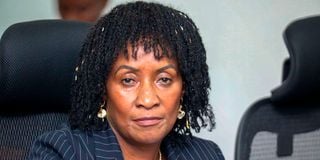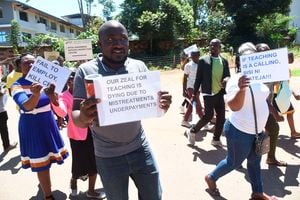
Teachers Service Commission Chief Executive Officer Nancy Macharia before the National Assembly Education Committee at Bunge Tower Nairobi on Wednesday, October 23, 2024.
Learners joining Grade 9 in January next year will face a myriad of challenges ranging from a shortage of teachers to inadequate infrastructure even as the government works to fix the problems.
Junior schools remain the most under-staffed segment in the basic education cycle. The staffing does not match the skill sets of the teachers.
Teachers Service Commission (TSC) Chief Executive Officer Nancy Macharia yesterday told the National Assembly Education Committee that the commission has been allocated funds to recruit 20,000 more teachers on contract for Junior School (Grade 7, 8 and 9).
This will take the total number of teachers in junior school to 76,928 which will be spread over 20,000 schools.
The recruitment translates to an addition of one more teacher (on average) to every school. This compares poorly to the 216,000 teachers deployed in primary schools and 125,000 in secondary schools. Next year, secondary schools will have learners in only Form 2, Form 3 and 4.
“I have never denied the fact that, as a country, we have a crisis and we need to look for ways to address it,” Ms Macharia told the committee.
The MPs raised concern over science subjects being taught by arts teachers who are not qualified to teach them.
Ms Macharia said that there is a dire shortage of science teachers, noting that several advertisements placed by the TSC have failed to attract enough applicants.
“We have to agree that there is a shortage of science teachers. When advertisements for physics teachers are made, nobody applies,” the TSC boss told the committee chaired by Tinderet Member of Parliament Julius Melly.
She said that arts teachers form the majority of teachers graduating from universities, making it difficult to get science teachers when jobs are advertised.
“What is happening in reality is that sciences are being taught by arts teachers. The teachers read at night and during the daytime they dictate to the students. What mode of teaching is that?” Asked Kabondo Kasipul MP Eve Obara.
Teaching science subjects is further complicated by the fact that public junior schools do not have laboratories and mainly use rudimentary equipment. This will likely impact the objective of the Competency-Based Curriculum Framework that aims at transiting 60 percent of learners from junior school to take up the science, technology, engineering and mathematics pathway.
At a separate event, Education Cabinet Secretary Julius Ogamba said the problem can be solved through retooling.
“The shortage of teachers is being addressed through retooling. Additionally, we have a plan in place to address the shortage of 20,000 teachers by January 2025. This is aimed at reducing the overall deficit. In areas where there are fewer teachers compared to the number of students, we are retooling those who may not have been trained by December and preparing them to handle Grade 9 students effectively,” said Mr Ogamba.
He affirmed the government’s commitment to employ all the teachers who have been teaching on contract since last year on permanent terms.
With just two months remaining before learners join Grade 9, the Ministry of Education has completed the construction of only 3,500 classrooms out of the targeted 11,000.
In August, the ministry announced that the government would build 18,000 classrooms to accommodate Grade 9 learners. According to the plan, 11,000 classrooms would be constructed by the ministry, with support from development partners while 7,000 others would be built through the National Government Constituency Development Fund (NG-CDF).
"We have already completed 3,500 classrooms. The next batch of 7,500 is under construction, with completion rates ranging between 22 percent and 68 per cent. Additionally, 5,000 more classrooms will be built in partnership with the ministry and other stakeholders,” said Mr Ogamba.
He reassured stakeholders that all the Grade 9 classrooms will be completed by January 2025.
[email protected]@ke.nationmedia.com






